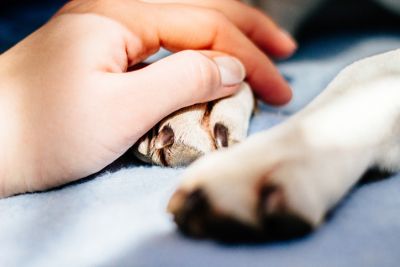 We need to grieve whenever we lose someone close to us, but what about our pets? Research and anecdotal evidence suggest that they feel the loss of a loved one just as much as we do. During this difficult time, there are a few key ways to put your furry friends on the road to healing and ensure that they remain healthy.
We need to grieve whenever we lose someone close to us, but what about our pets? Research and anecdotal evidence suggest that they feel the loss of a loved one just as much as we do. During this difficult time, there are a few key ways to put your furry friends on the road to healing and ensure that they remain healthy.
Observing Grief in Our Canine Companions
Dogs have certainly earned the nickname as “man’s best friend,” remaining at our side as workers, protectors and trusted guides for thousands of years. As a 2010 Scientific American article explains, dogs have developed specific social behaviors that help them successfully communicate or cooperate with human beings. Domestication’s influence on the species could account for why dogs and humans can frequently and successfully interact with each other.
Perhaps our long history with domesticated canines has also given us a little insight into how they express emotion and bond with us. In his “Canine Corner” column published by Psychology Today, Dr. Stanley Coran illustrates this idea by mentioning an 1837 painting, "The Old Shepherd's Chief Mourner,” in which a dog is shown resting its head on the lid of its human companion’s coffin. He also told the story of how his dog Dancer behaved when his pooch pal, Odin, suddenly passed away. In anguish, Dancer would check Odin’s old haunts, hoping that his friend would reappear. Coran proposes that dogs may not understand the concept of death being permanent, and continue to wait for a cherished companion who may never return.
What About Our Feline Friends?
We often think of cats as aloof, distant and unattached. Nevertheless, many who share their homes with feline friends challenge the notion that their kitties are uncaring. Some report that their cats draw closer to them when they are injured, ill or in emotional distress. Although your kitty’s reaction to losing a fellow pet or family member depends largely on its personality, International Cat Care advises that you might witness pacing, searching, sniffing and excessive vocalizing. While we don’t understand cats’ behavior quite as extensively as dogs, some observations suggest some emotional impact and upheaval in the wake of a loss.
How Can I Help My Pets?
Dogs and cats can exhibit some common symptoms while mourning the loss of a human family member or animal companion. Canine expert Cesar Milan discloses that pooches might become sluggish, reduce their food and water intake and lose interest in their favorite activities. Kitties may become withdrawn, depressed and less playful. If you witness your pets refusing food or water or becoming less active, it’s a good idea to take them to your veterinarian to rule out physical causes.
Most experts also suggest maintaining normal routines for your pets, along with showing them some patience, to give a sense of familiarity during this time. Milan adds that some additional playtime worked into a dog's day can help increase its serotonin levels. For felines, make sure that they have safe access to food, water and litter boxes. If a fellow pet has died, avoid removing its belongings right away, and allow your animal companion to initiate comfort and social contact. Finally, don't rush to include a new pet in the household, as your current companion may see the newcomer as an unwelcome intrusion.
Keep Your Pets Healthy After a Loss
Consistency and familiarity in your home provide your pets with stability after losing a loved one. Sticking to established routines and letting the general environment remain unchanged signals to your faithful friends that home is still a safe place. Teaming up with your vet to keep them healthy, and allowing them to approach you for comfort, are also wise moves to aid in healing.
Add Your Comment